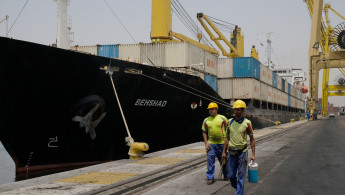Syrian regime, Iran launch direct shipping route amid continued Syrian cash crunch
The Syrian regime and Iran completed preparations on Wednesday for a new, direct shipping route between the Syrian port of Latakia and the Iranian sea town of Bandar Abbas, sources in Damascus told The New Arab’s Arabic-language service.
The head of the Iran-Syria Joint Chamber of Commerce, Keyvan Kashefi, announced the opening of the new shipping route last month, Hellenic Shipping News reported.
Kashefi said that the shipping line would operate monthly but this could be increased to twice a month if there was demand.
"There are no restrictions on export items; these ships are both container and bulk carriers, and any trader can choose Syria as his export destination if he/she wants," he told Hellenic Shipping News.
The sources who spoke to The New Arab’s Arabic service said that there had been "extensive" trade negotiations between Tehran and Damascus.
This includes a meeting between Syrian regime Agriculture Minister Mohammed Hassan Qatana and Sorena Sattari, Iran's vice-president for science and technology who recently visited Damascus.
|
|
Iran has been one of the main backers of the Syrian regime since the start of the uprising against President Bashar Al-Assad's authoritarian rule in 2011, sending militias to fight on the regime's side against rebels.
Read more: Investing in death - How Iran funded Assad's war at the expense of its own citizens
However, the volume of trade between Iran and Syria has declined sharply since 2011.
Syria is currently in the middle of a severe economic crisis as a result of ten years of conflict and rampant corruption at the top levels of the Assad regime. Roughly 80 percent of Syrians now live in poverty.
Assad also blames US and international sanctions for Syria's current economic crisis, although Washington says the penalties only target key regime figures.
Osama Qadi, the head of the Syrian Economic Task Force, told The New Arab’s Arabic-language service that the value of trade between Iran and Syria was only $85 million last year, declining from approximately $1 billion in 2009.
Currently, Iranian exporters have to wait weeks before their goods are sent to Syria.
However, Qadi added that some Iranian exports to Syria are not recorded in official figures, including weapons and war equipment.
Another Syrian economic analyst, Mohammed Tayeb Al-Elu, told The New Arab's Arabic-language service that Iran wanted a foothold in the Syrian economy after its military presence in the country had suffered due to US sanctions and Israeli strikes.
He predicted that it would be difficult for Iran to achieve this due to the ongoing economic crisis and dominance of Chinese consumer products in the Syrian market.
Follow us on Facebook, Twitter and Instagram to stay connected





 Follow the Middle East's top stories in English at The New Arab on Google News
Follow the Middle East's top stories in English at The New Arab on Google News


